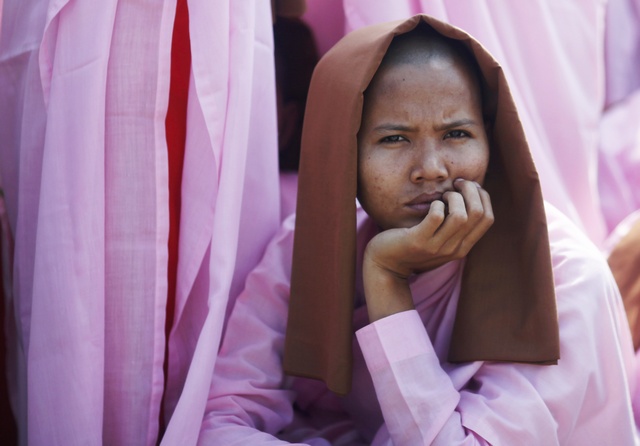”Our Buddhist women are not intelligent enough to protect themselves,” a religious leader declared last week in defence of a controversial law that would effectively ban interfaith marriages in Burma.
The draft law, which garnered the support of an all-male convention of 1,500 senior monks in Rangoon on Thursday, has exposed a poisonous mix of structural racism and misogyny at the heart of Theravada Buddhism in Burma.
The legislation, if passed, would require Buddhist women to obtain permission from both her family and local authorities before marrying a man of a different faith. This provision was originally targeted exclusively at Muslim men, but later revised in a bid to be “more balanced”. This “balance” of course only sought to redress its distinctly anti-Muslim agenda, rather than the inherent sexism that underpins it.
In part, this reflects a dogmatic and patriarchal interpretation of Theravada Buddhism in Burma that seems to indoctrinate the subordination of women. Nuns – who were notably absent from last week’s convention – make up roughly one in six of the Buddhist clergy in Burma. But they are not afforded the same virtues as their male counterparts and it is widely believed that women cannot attain enlightenment. Women are subsequently banned from visiting the “holiest” parts of religious monuments.
Nuns cannot be fully ordained, because the ceremony requires at least five other fully ordained nuns to complete, and this community of women – known as the Bhikkhuni Sangha in Theravada Buddhism — died out centuries ago. Despite attempts to resuscitate the practice in other Theravada countries by using fully ordained nuns from the Mahayana Buddhist tradition to perform the rituals, it has been met with hostility in most conservative circles and is not recognised in Burma.
This means that nuns are formally excluded from the Burmese Sangha – or monastic community – and are not allowed to deliver sermons or participate in high-level religious debates. In 2005, a nun was arrested and jailed by the military junta for returning to Burma after becoming fully “ordained” in Sri Lanka.
After being forced to “unconditionally” apologise for her actions, she was promptly deported back to Sri Lanka. In her evocative account of life as a nun in Burma, she recalls being forced to bow down to novice monks as young as five, even if they had been “in robes for less than a day”. In other words, Burmese nuns are considered spiritually and intellectually inferior to monks of any age, experience or education.
[pullquote] “Patriarchal structures are endemic throughout Burma’s states and provinces.” [/pullquote]
In the context of the Sangha — which carries enormous moral and political weight in Burmese society – it means that women’s voices are marginalised, if not completely ignored. Monks are less likely to take an interest in social issues that affect women, such as sexual and reproductive rights or marital autonomy. Conversely, both the state-backed Sangha Maha Nayaka Committee and prominent supporters of the 2007 anti-government “Saffron Revolution” have played an increasingly vocal role in supporting the interfaith marriage ban.
It is perhaps unsurprising, albeit ironic, that both the Burmese military and the monkhood – two male-dominated and deeply hierarchical institutions – would embrace a shared platform for misogyny. In fact, when monks claim to be “protecting” Buddhist women from their own choices, it reeks eerily of the same condescending paternalism and machismo employed by the military regime to keep the pro-democracy movement in check.
There is an ongoing scholarly debate about whether Theravada Buddhism is intrinsically sexist or has come to internalise a wider culture of gender bias. In many ways this echoes the same parochial and myopic arguments that have contaminated western political discourse for many years – whether it’s a question of same-sex marriage, access to safe abortion or the ordination of female bishops.
But certainly the draft law highlights the social, political and cultural ostracism of women in Burma, entrenched by nearly five decades of military rule. Burma is one of only two ASEAN countries, where domestic violence is still legal – despite having one of the highest recorded rates in the region. Marital rape is not considered a crime; while abortion is illegal in all circumstances except to save a woman’s life and botched procedures are a leading contributor to Burma’s cataclysmic maternal death rate.
Despite some commendable efforts by Aung San Suu Kyi to include more women in the 2012 by-elections, they still hold a tiny 5.7 percent of seats in the lower house of parliament, and an abysmal 1.8 percent in the upper house. (This should worry anyone, who fears the draft law might live to see the fluorescent lights of parliament.) Section 352 of the 2008 constitution even sanctions professional discrimination on the basis of gender as long as it is for “positions that are suitable for men only”.
Decades of brutal civil wars have taught Burma’s armed forces to rape and pillage with impunity. This violence, targeting Christians, Muslims and Buddhists alike, has sent a clear message that women’s bodies are collateral damage, if not instruments of war. The ethnic peace processes have been equally marred by a systematic exclusion of female voices – an absence which risks fuelling further gender based violence down the road.
Indeed patriarchal structures are endemic throughout Burma’s states and provinces. The Lokaniti or “Guide to Life”, a 14th century Burmese text, which outlines a woman’s role as domesticated and servile, still carries significant influence among its majority Buddhist population. Luckily, it has not stopped women from speaking out against the monks’ proposal.
But the support it has garnered from the monkhood, and the reluctance of a male-dominated Buddhist government to condemn it, remains deeply troubling. It certainly illustrates the need for a strong, organised and vocal feminist movement that cuts across Burma’s religious and secular spheres. In the meanwhile, anyone threatening to strip votes from politicians who oppose the ban would do well to remember that 50.3% of Burma’s electorate are women.



